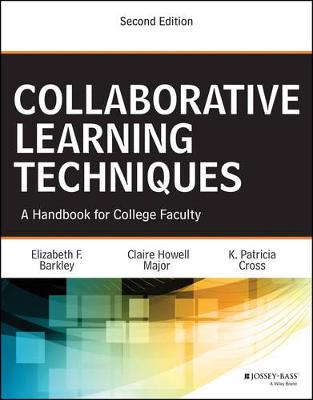Jossey-Bass Higher and Adult Education
3 total works
Collaborative Learning Techniques
by Elizabeth F Barkley, Claire H. Major, and K. Patricia Cross
Published 1 October 2004
Engaging students in active learning is a predominant theme in today's classrooms. To promote active learning, teachers across the disciplines and in all kinds of colleges are incorporating collaborative learning into their teaching. "Collaborative Learning Techniques" is a scholarly and well-written handbook that guides teachers through all aspects of group work, providing solid information on what to do, how to do it, and why it is important to student learning. Synthesizing the relevant research and good practice literature, the authors present detailed procedures for thirty collaborative learning techniques (CoLTs) and offer practical suggestions on a wide range of topics, including how to form groups, assign roles, build team spirit, solve problems, and evaluate and grade student participation.
Keeping students involved, motivated, and actively learning is challenging educators across the country,yet good advice on how to accomplish this has not been readily available. Student Engagement Techniques is a comprehensive resource that offers college teachers a dynamic model for engaging students and includes over one hundred tips, strategies, and techniques that have been proven to help teachers from a wide variety of disciplines and institutions motivate and connect with their students. The ready-to-use format shows how to apply each of the book's techniques in the classroom and includes purpose, preparation, procedures, examples, online implementation, variations and extensions, observations and advice, and key resources.
"Given the current and welcome surge of interest in improving student learning and success, this guide is a timely and important tool, sharply focused on practical strategies that can really matter."
?Kay McClenney, director, Center for Community College Student Engagement, Community College Leadership Program, the University of Texas at Austin
"This book is a 'must' for every new faculty orientation program; it not only emphasizes the importance of concentrating on what students learn but provides clear steps to prepare and execute an engagement technique. Faculty looking for ideas to heighten student engagement in their courses will find usefultechniques that can be adopted, adapted, extended, or modified."
?Bob Smallwood, cocreator of CLASSE (Classroom Survey of Student Engagement) and assistant to the provost for assessment, Office of Institutional Effectiveness, University of Alabama
"Elizabeth Barkley's encyclopedia of active learning techniques (here called SETs) combines both a solid discussion of the research on learning that supports the concept of engagement and real-life examples of these approaches to teaching in action."
?James Rhem, executive editor, The National Teaching & Learning Forum
"Given the current and welcome surge of interest in improving student learning and success, this guide is a timely and important tool, sharply focused on practical strategies that can really matter."
?Kay McClenney, director, Center for Community College Student Engagement, Community College Leadership Program, the University of Texas at Austin
"This book is a 'must' for every new faculty orientation program; it not only emphasizes the importance of concentrating on what students learn but provides clear steps to prepare and execute an engagement technique. Faculty looking for ideas to heighten student engagement in their courses will find usefultechniques that can be adopted, adapted, extended, or modified."
?Bob Smallwood, cocreator of CLASSE (Classroom Survey of Student Engagement) and assistant to the provost for assessment, Office of Institutional Effectiveness, University of Alabama
"Elizabeth Barkley's encyclopedia of active learning techniques (here called SETs) combines both a solid discussion of the research on learning that supports the concept of engagement and real-life examples of these approaches to teaching in action."
?James Rhem, executive editor, The National Teaching & Learning Forum
Classroom Research is designed for use in faculty discussion groups, workshops, and seminars to prepare discipline-oriented faculty for the Scholarship of Teaching and Learning. The book's real-life case studies illustrate basic principles of learning and provide provocative materials for discussion along with practical suggestions for research that can be conducted by faculty from all disciplines in their own classrooms.

